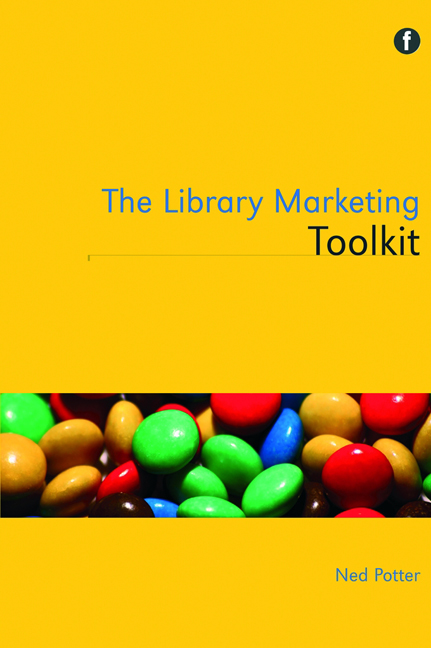Book contents
- Frontmatter
- Dedication
- Contents
- Acknowledgements
- Introduction
- 1 Seven key concepts for marketing libraries
- 2 Strategic marketing
- 3 The library brand
- 4 Marketing and the library building
- 5 An introduction to online marketing
- 6 Marketing with social media
- 7 Marketing with new technologies
- 8 Marketing and people
- 9 Internal marketing
- 10 Library advocacy as marketing
- 11 Marketing special collections and archives
- A final word on marketing libraries
- Appendix: Glossary of Web 2.0 tools and platforms
- References
- Index
11 - Marketing special collections and archives
Published online by Cambridge University Press: 08 June 2018
- Frontmatter
- Dedication
- Contents
- Acknowledgements
- Introduction
- 1 Seven key concepts for marketing libraries
- 2 Strategic marketing
- 3 The library brand
- 4 Marketing and the library building
- 5 An introduction to online marketing
- 6 Marketing with social media
- 7 Marketing with new technologies
- 8 Marketing and people
- 9 Internal marketing
- 10 Library advocacy as marketing
- 11 Marketing special collections and archives
- A final word on marketing libraries
- Appendix: Glossary of Web 2.0 tools and platforms
- References
- Index
Summary
Introduction
Special collections and archives come with their own set of marketing challenges and techniques. ’m going to risk the wrath of both communities by stating that although special collections and archives are often distinct areas, there are many similarities in the way they are marketed. Certainly it is the case that some ideas and methods can apply to both and it is these on which w'll be focusing in this chapter.
Although this chapter concentrates on the specific challenges of these related sectors, it's worth making clear that many of the ideas apply in marketing libraries more broadly (tying in your promotional activity with the wider cultural landscape, for example) and, conversely, most of the other techniques described in this book still very much apply in special collections and archives, too. In particular, the need for a strategic approach is still relevant, and using social media to promote archives can be very effective: old source material and new technologies are surprisingly comfortable bedfellows. Every marketing channel should be exploited, and every market considered, as Caroline Kimbell of The National Archives (TNA) says:
Even under the constraints of a marketing freeze, TNA has managed to keep its public profile high and its media presence a constant. This isn't just because we have great stories to tell from the documents and people who know them, but because w've been creative in how we use all the free tools and services available to reach new and existing audiences, and borne in mind the broad range of user groups who use and interact with our collections – from schoolchildren and academic researchers to journalists, authors, family historians and information management professionals.
There are four case studies here. Caroline Kimbell focuses on digitization and the ‘halo effec’. Then Alison Cullingford at Bradford University Library talks us through some modern ways of marketing ancient materials, with the 100 Objects campaign. Ben Showers of JISC focuses on harnessing the power of crowds, and the marketing benefits this can bring. To kick the chapter off, we have the first case study – expert advice on marketing archives from Lisa Jeskins.
- Type
- Chapter
- Information
- The Library Marketing Toolkit , pp. 177 - 194Publisher: FacetPrint publication year: 2012



